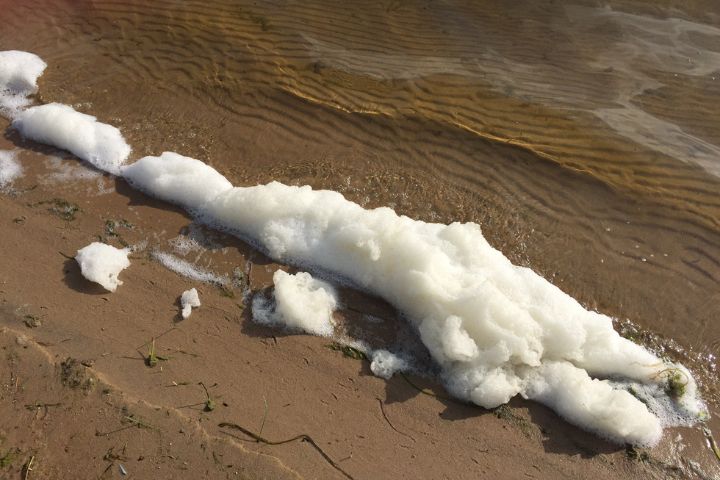Three new sustainability catalyst grants will support novel research projects beginning this summer to address vexing sustainability challenges. Each project is designed to identify, engage, and respond to the needs of external partners who are positioned to apply the project's outputs in real-world decision-making and practice.
The new projects, which received $10,000 each, include “Plast-ick,” which leverages AI and satellite data to predict pollutants like PFAS in water bodies. This project aims to reduce the labor involved in tracking pollution and ensure vital information reaches affected communities through collaboration with the Environmental Working Group.
Another project, “Catching the Waves,” focuses on deploying wave energy converters to power remote coastal communities, starting with Beaver Island in Lake Michigan. This project aims to provide clean, reliable energy and reduce dependence on diesel generators.
The third project, "Mussel Roads," uses biomimicry to enhance asphalt durability by developing materials inspired by mussel-binding proteins. This project aims to create more resilient roads, reduce repair-related waste and energy consumption, and improve road safety.
“As longtime Michiganders, we recognize the critical need to improve the weatherability of asphalt pavement,” said Jinsang Kim, professor and director of Macromolecular Science & Engineering, professor of Materials Science & Engineering, and principal investigator of Mussel Roads. “Through this catalyst grant, we aim to achieve laboratory-scale research outcomes showing that our bio-inspired adhesion promoter will lead to more resilient roads.”
The catalyst grant program, which is offered by the Graham Sustainability Institute, has supported over 40 projects since its inception in 2017.
“These projects exemplify the innovative and collaborative spirit we strive to foster through Graham’s sustainability catalyst grants,” said Jennifer Haverkamp, Graham Family Director. “Each project addresses a unique challenge with the potential for significant impact, from enhancing road durability and safety to harnessing renewable energy and mitigating environmental pollution.”
To learn more about the new projects, read on and visit the project web pages linked below.
Plast-ick
Harnessing AI to Predict Environmental Pollution Exposure

PFAS foam in Van Etten Lake, Oscoda, MI | Photo by Michigan EGLE on Flickr
Pollutants such as PFAS and pesticides pose significant threats to both the environment and human health. This research team aims to develop innovative solutions to reduce the labor required to identify and track pollutant hotspots in collaboration with Environmental Working Group (EWG), a leading public interest organization at the forefront of mapping and communicating contamination issues that impact public health.
The project will utilize advanced AI algorithms and satellite data to predict pollutant presence in water bodies. By integrating AI techniques with hydrological models, the team hopes to improve prediction accuracy and gain insights into the sources of contamination, with a particular focus on PFAS.
The project is expected to yield a proof-of-concept AI model, a list of research questions for future exploration, and advancements in AI, remote sensing, and sustainability research.
Project team: Elizabeth Bondi-Kelly, PI (Electrical Engineering and Computer Science); David Andrews (Environmental Working Group); Kaley Beins (Environmental Working Group); Aradhna Krishna (Ross School of Business)
Catching the Waves
Empowering Beaver Island with Clean, Local Energy

Harbor Light, Beaver Island, MI | Photo by James Hatcher on Flickr
With an energy density more than ten times that of wind energy, marine wave energy is a promising solution for sustainable power generation. Although prototypes have been deployed worldwide, demonstration of grid-connected wave energy converters (WECs) is still lacking. To bridge this gap, this project team will conduct a feasibility study on powering remote and underserved coastal communities using cutting-edge wave energy research.
Beaver Island in Lake Michigan is home to approximately 600 permanent residents who depend on fragile power connections and diesel generators. Over the past year, the research team has engaged with Beaver Island residents, who will serve as the demonstrative end-users for this project. The project is designed to be highly transferable, with the potential to benefit thousands of islands across the U.S. facing similar energy challenges.
The catalyst grant will support a crucial aspect of the project: identifying the optimal location to deploy a WEC on Beaver Island. Potential sites will be assessed on wave energy resources, environmental sustainability, and community preferences. Finding just the right location for the WEC will represent a significant step toward empowering the Beaver Island community with clean and reliable energy, and will position the team favorably for follow-on funding.
Project team: Xiaofan Li, PI (Naval Architecture and Marine Engineering); Gail Gruenwald (Beaver Island Association); Ayumi Fujisaki-Manome (Cooperative Institute for Great Lakes Research/Climate & Space Sciences and Engineering); Lei Zuo (Naval Architecture and Marine Engineering)
Mussel Roads
Using Biomimicry to Engineer Asphalt Durability

Roads in cold climates and coastal regions face constant threats from harsh weather conditions, leading to rapid deterioration and posing safety risks to motorists. This project aims to strengthen asphalt roads, reducing the need for repairs and lessening their impact on the environment, economy, and society.
Drawing inspiration from mussel-binding proteins, the research team will develop specialized materials to enhance the bond between asphalt binders and aggregates. The team will investigate how these materials function at a molecular level, conduct practical strength tests, and collaborate closely with a road expert to ensure their practical utility. The ultimate objective is to create more durable asphalt, thereby minimizing issues like potholes and cracks. Increasing road resiliency will reduce waste and energy consumption associated with repairs, as well as pollution from asphalt processing. Prolonging the lifespan of roads will also save money and enable funds to be allocated to other essential projects.
The research team hopes that by enhancing road safety and reducing traffic congestion, more durable roads will contribute to improved quality of life for communities, alleviating stress on commuters and travelers.
Project team: Jinsang Kim, PI (Materials Science and Engineering); Zhan Chen (Chemistry); Zhanping You (Civil, Environmental, and Geospatial Engineering, Michigan Technological University)
The catalyst grant program at the Graham Sustainability Institute is administered by Maggie Allan ([email protected]). Visit graham.umich.edu/catalyst to learn more about the program.